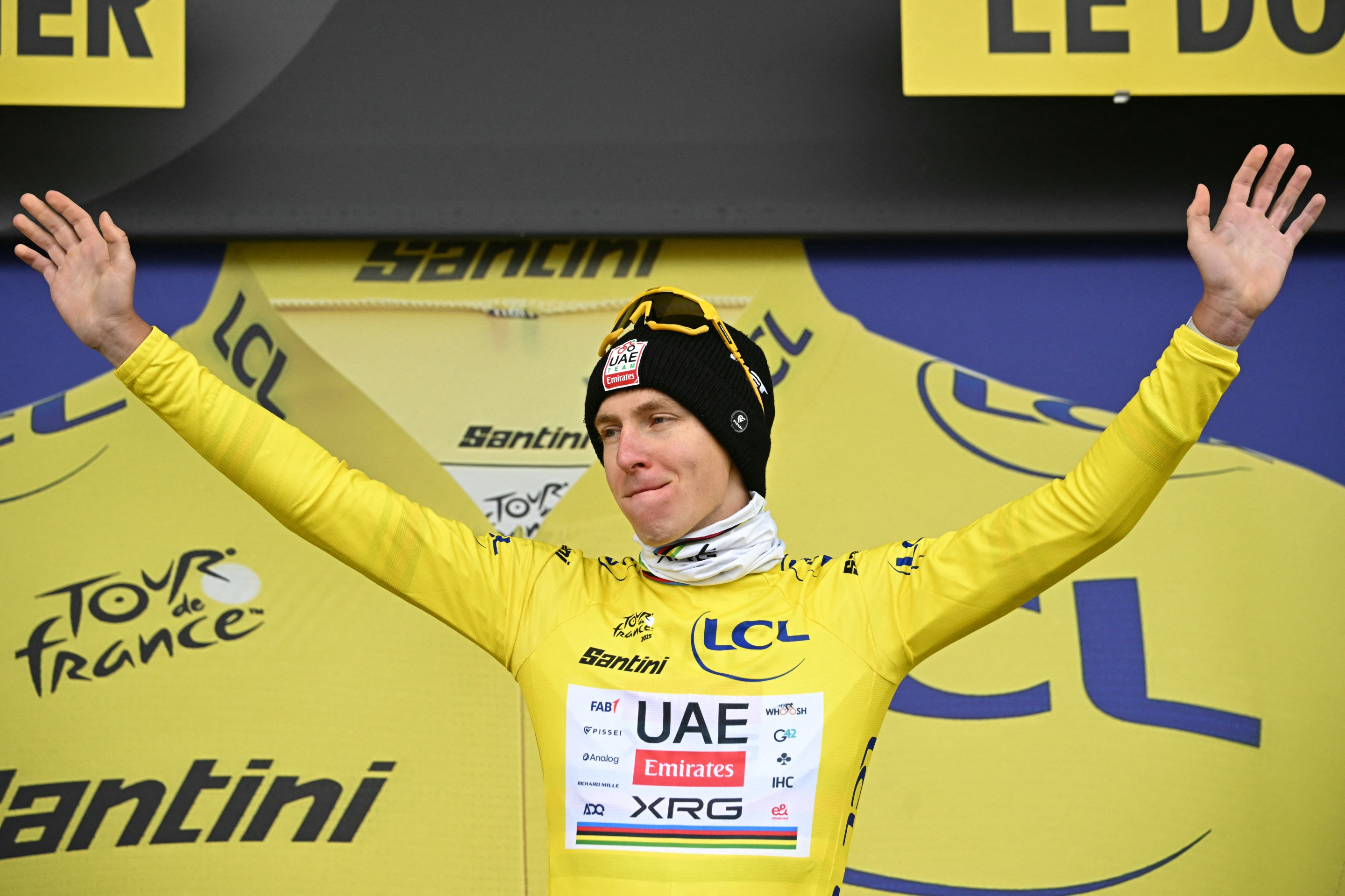PARIS — Tadej Pogacar rolled across the line atop La Plagne, wet and miserable. The yellow jersey appeared to weigh him down, like a suit of armor worn to guard against heavy blows which couldn't reach him anyway. His expression never shifted out of bland disgruntlement the entire way up the final summit finish of the Tour de France. With Thymen Arensman all but bleeding out a couple of seconds in front of a small group composed of this year's podium, and a stage win hanging in the balance, the sport's greediest winner sat there, indifferent. He had won four stages and built his Tour-winning margin a week ago, so what was the point of extra suffering? The race was over. What could have been gained from punishing his rivals even further? Why win more than necessary?
These are not questions Pogacar has even entertained before. Pogacar's defining trait as a competitor—the aspect that's made him not only a champion but the most feared rider on the road—is his insatiability. For the second time in his illustrious career, Pogacar has won two Tours de France in a row. But for the first time, the prospect of winning seems to bore him. "I'm at a point where I wonder why I'm still here," he said after La Plagne. "It's been three very long weeks. You're counting down the kilometers to Paris. I can't wait until it's over so I can have some fun things in my life again."
If the story of his first three Tour wins was a slightly different type of defiance each time—respectively: insubordination, bullying, revenge—this year's race for the yellow jersey lacked such a narrative hook. It was simple smothering dominance. When this Tour is mentioned a decade from now, it will be between commas, an unremarkable fourth on the growing list of Pogacar Tour victories. This one raised no questions about the racing itself, only about the shape of the legacy Pogacar will build, and whether anyone can stop him. So what are we to make of an all-time great settling in for the long ride, shedding his impish tendencies for staid responsibility?
The one interesting thing Pogacar said in his final winner's press conference before Paris was that 2025 was the hardest Tour he's done. That was by design. The price of winning the Tour is having race organizers respond to you as an antibody would to a pathogen, creating a route designed against your strengths. Simultaneously taking down the best climber in the world and a Paris-Roubaix second-place finisher, one who receives such incredible support, is quite the tall order. Route designer Thierry Gouvenou's tactic was to prolong tension, with 10 stages before the first rest day, mostly on the windy, punchy, narrow roads of northern France, sapping Pogacar's team ahead of the grinding high-Alpine climbs where Jonas Vingegaard has broken him before.
His plan was a sound one, in the sense that Vingegaard's Team Visma took up the challenge and went after UAE. It had an effect, though not the desired one. "They kind of broke 99 percent of the peloton," EF's Charly Wegelius told me. "Just not UAE." Pogacar hit the third week exhausted and without his best climbing lieutenant, but before he got there, he'd already won two punchy stages and two mountaintop finishes and built an insurmountable four-minute advantage over Vingegaard. It's difficult to pick a moment he won the Tour, since he was the best rider in the peloton from Stage 1, but he put it out of reach on the Hautacam. The interesting part of Stage 11 was how much work Vingegaard's team put into setting something up for their leader, only for their plan to backfire. Instead of isolating and testing Pogacar, they turned their own legs to jelly and gave him the platform from which to launch his huge attack.
After a cursory time trial win the next day, what followed was nine days of defensive riding. Visma would try to isolate Pogacar, and occasionally it would work. Then Vingegaard would attack first, Pogacar would follow without appearing to even breathe out of his mouth, and they would ride together until the final few hundred meters, when Pogacar would attack, shed his Danish rival, and pick up a handful of seconds. He clearly wants to beat Mark Cavendish's record of 35 stage wins, but he didn't want to risk the yellow jersey—a prudent choice for a rider who's so particularly beloved for never doing the prudent thing.
While Gouvenou may have succeeded in prolonging that particular overtake, he may have shown in the process that there might not be any beating Pogacar for a while. Tactics don't work on someone this strong, and his strength exudes quite the pressure. Several directors I spoke to said they'd told their riders to all but ignore Pogacar. Try to stick with his pace, and you will destroy yourself in the process. "We're not competing directly against him," said a director of a rider who finished in the top 10. Perhaps only Vingegaard was, which is admirable in its own right. He's beaten Pogacar twice, but after 2025, it is uncomfortably clear that even the best tactics in the world can only limit him from reaching the impossible standard he set last year. Visma has to settle for the consolation prize of making him grumpy.
A theoretical exercise: What would beating Pogacar look like? I put the question to several people, including a pair of directors, Wegelius and Uno-X's Stig Kristiansen. "You have to find solution which really doesn't exist," Kristiansen said. "I don't have the answer on how to break him, because so far, he has been unbreakable." He said the place to start would be finding ways to isolate him. "The killer combination that Pogacar has is the strength of his team and his own personal talent," Wegelius said when Joshua Robinson and I posed the question to him. "So therefore, you can't do anything about his talent, but you can attack his team."
Visma's tactics have drawn heavy criticism, though both directors made clear they were trying something unlikely to work in the first place, because Pogacar has shown he doesn't even need teammates to win. "If [Visma] do nothing, everyone criticizes them for doing nothing," Wegelius said. "If they try, everyone says they're doing it wrong. They've got quite the challenging task." I asked him what the ideal team would look like for such a task. "I'd have a couple of Wout van Aerts to make make a mess of the wind," he said. "And then I'd want hyperreactive climbers who can stay close in GC for a long time, but can also do multiple pace changes." Interestingly, he mentioned last year's third-place finisher Remco Evenepoel, not as the leader of this fantasy team, but as the ideal super-domestique.
He cooked up a scenario: Early on in the race, ideally on the unrelenting, tricky cols of the Massif Central, this theoretical team has several riders who are close enough to the yellow jersey that Pogacar can't just let them ride away. They isolate Pogacar on a climb, then draw him down into the valley to take turns attacking him on flat roads. "If you could create a situation like that where it was stop-and-go, with people you couldn't ignore, going, one, two, three, four, five, six times, and he has to respond, then maybe you start to see something."
Fun to imagine, but we don't live in that world. We live in the one where Pogacar is now a four-time Tour de France winner at 26, burdened less by the demands of winning this particular race but with the psychic and physical onus of having to get up and do this several more times to break and then expand the record. It seems exhausting to fight history. Whether he has the talent to become the first rider to win six Tours de France is beyond question. There hasn't been a rider of Pogacar's talent in the peloton in decades, maybe ever. For years, that was pure blessing, a gift to the viewing public and himself. Pogacar is still an indomitable force of winning. He just bears the pressure differently now. The boy-king of the peloton has grown into his powers, which are awe-inspiring as ever, just not quite as fun.






